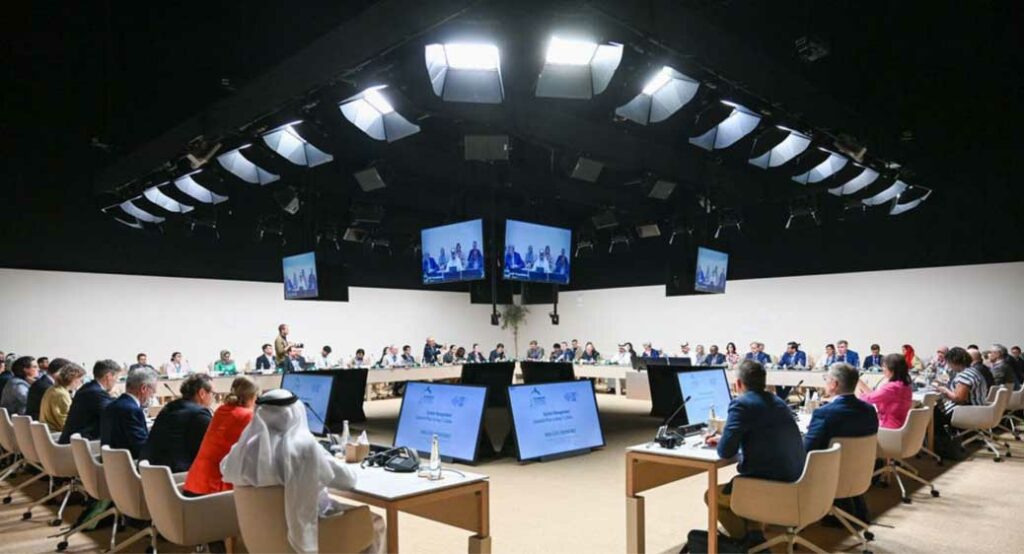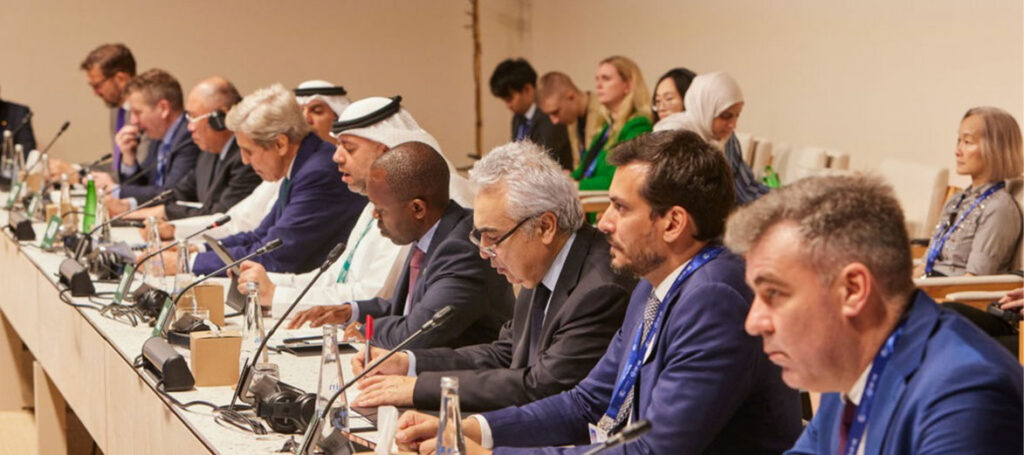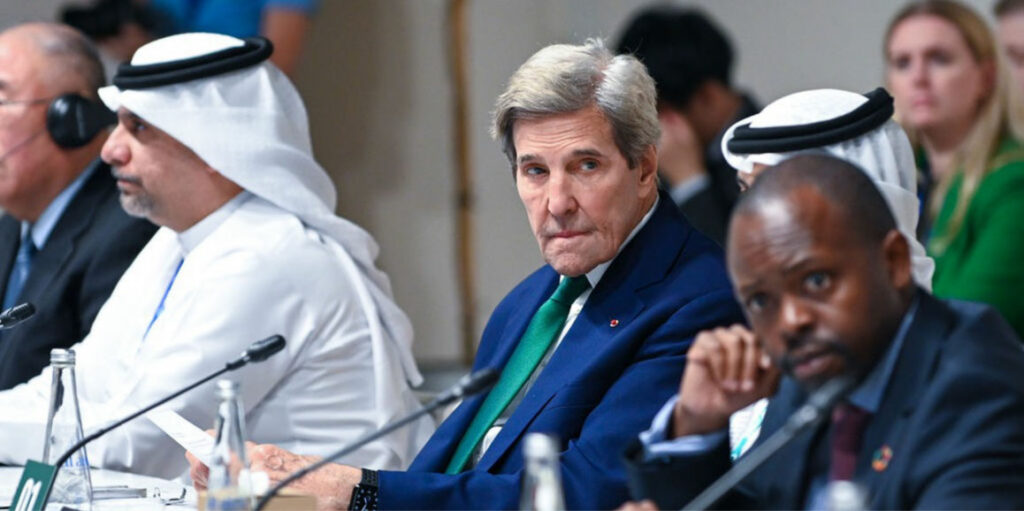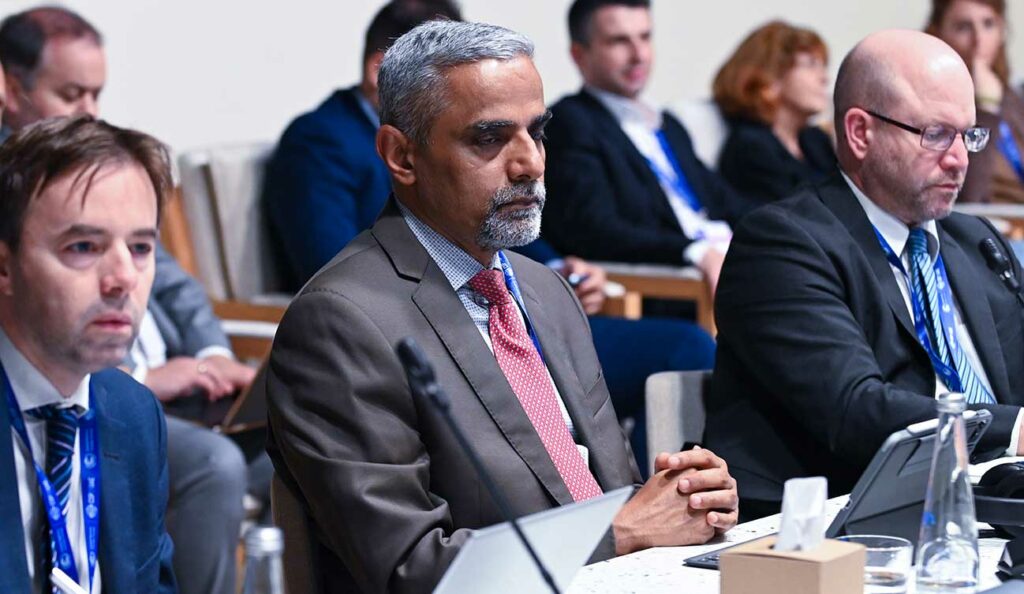5 December 2023
COP28 Presidency highlights role of carbon management in keeping 1.5°C within reach
COP28 Presidency highlights role of carbon management in keeping 1.5°C within reach as an additional six countries join Carbon Management Challenge
- Attendees of ‘Carbon Management: Essential Pillar to Keep 1.5°C Alive’ expressed broad agreement to expand renewable energy capacity, reduce deforestation, and cut non-CO2 greenhouse gas emissions, while addressing the need for countries to scale up carbon management in line with the science.
- During the event, the Carbon Management Challenge (CMC), a global initiative to accelerate the deployment of carbon management technologies, was also discussed and six additional countries announced their membership, bringing total signatories to 19 countries plus the European Commission.
- Representatives of the Carbon Management Challenge Co-Sponsors—Brazil, Canada, Indonesia, the United Kingdom, and the United States—along with high-level officials from China, Kenya, Denmark, Senegal, Japan, Bahrain, Iceland, Mozambique, Romania, and Sweden, reaffirmed the importance of scaling carbon management technologies globally this decade.
- The International Energy Agency and the Asian Development Bank also provided updates on the urgent need for carbon management in both developed and emerging economies during the roundtable.

Dubai, 5 December 2023: The COP28 Presidency has convened a roundtable of ministers and high-level officials from over 20 countries to focus on the critical role of carbon management in keeping 1.5°C within reach.
The event, ‘Carbon Management: Essential Pillar to Keep 1.5°C Alive,’ was held at COP28 and co-hosted by Brazil, Canada, Indonesia, the United Kingdom, and the United States.
Attendees, who included representatives from China, Kenya, Denmark, Senegal, Japan, Bahrain, Iceland, Mozambique, Romania, and Sweden – expressed broad agreement to pursue actions to expand renewable energy capacity, reduce deforestation, and cut non-CO2 greenhouse gas emissions, while addressing the need for countries to scale up carbon management in line with the science.
“Carbon management, including carbon capture and direct air capture is needed to get to net zero; especially in heavy industry,” said Ambassador Majid Al-Suwaidi, the COP28 Director-General, “However, I want to be clear that we aren’t promoting carbon capture to prolong the current energy system. Carbon management is not a substitute for accelerating other mitigation efforts. We must remain committed and conscious that technology development in carbon management must be done in a sustainable way and with the continued support of the economic aspirations of developing countries in the Global South.”

During the event countries highlighted ongoing and planned efforts to further advance the deployment of carbon management solutions and address the gap between current levels of deployment and the levels needed to achieve net-zero emissions by 2050.
During the event the Carbon Management Challenge, a global initiative, was also a major focal point. Launched at the Major Economies Forum in April, it encourages countries to rapidly accelerate projects to abate CO2 emissions. Representatives from Kenya, Iceland, Mozambique, Netherlands, Romania and Senegal announced their membership of the initiative during the roundtable, taking total signatories to 19 countries and the European Commission.
Dr. Fatih Birol, Executive Director of the International Energy Agency said: “The Carbon Management Challenge is a very important initiative, and it is important that we support the development of projects in emerging and developing economies. Carbon management does not compete with the deployment of clean energy and renewable energy infrastructure. We are looking forward to making the Carbon Management Challenge a full success.”
During the roundtable the IEA and the Asian Development Bank provided updates on the urgent and essential need for carbon management in both developed and emerging economies.

John Kerry, the United States Special Presidential Envoy for Climate, said, “Globally, there’s still an enormous gap between the levels of carbon management that are deployed and what we absolutely need to be deployed.”
China’s Special Envoy for Climate Change, Xie Zhenhua, participated in the roundtable, stating that: “China will closely watch the progress of the Carbon Management Challenge, and is also willing to collaborate with CMC by sharing and exchanging experiences.”
Last month, China and the United States agreed to advance climate cooperation on a range of measures, including exchanging information on policies and technologies to reduce greenhouse gas emissions.
While current global rates of carbon management deployment fall below those in modelled pathways limiting global warming to 1.5°C or 2°C, the Carbon Management Challenge is focused on the principle that carbon management at gigaton scale – collectively managing 1 gigaton or more of CO2 annually – will play a vital role in addressing the shared climate challenge.

While acknowledging that carbon management should not compete with advancing the deployment of clean energy solutions, Thiago Barral, Secretary for Energy Transition at Brazil’s Ministry of Mines and Energy on behalf of Alexandre Silveira, Minister of Mines and Energy said: “We are looking forward to making the Carbon Management Challenge a full success.”
Carbon Management Challenge countries represent global diversity and include members from all major regions of the world, countries with different energy supply profiles and both developed and emerging economies. This exemplifies the collective global effort required to scale carbon management and reach net zero goals.
Dr. Ali Mohamed, Kenya’s Climate Envoy, said: “We have joined the Carbon Management Challenge because we have start-ups that have been doing relatively well in this important space and our geological formations provides a great opportunity for us to be part of this geological solution.”
National Energy Director of Ministry of Mineral Resources and Energy in Mozambique Marcelina Joel Mataveia, expressed, “We are extremely proud to join the CMC that shows our strong commitment to actively pursuing policy projects and partnership that advance this critical climate solution.”
Speaking on the diverse applications of carbon management technologies, Mattias Frumerie, Climate Ambassador of Sweden said: “CCUS and BECCS will play a crucial role for Sweden to reach net zero and we are committed to raise the ambition for CCUS and BECCS in the coming years and committed to making it a reality. We look forward to working with others in the context of the Carbon Management Challenge to ensure delivery of our joint targets.”


